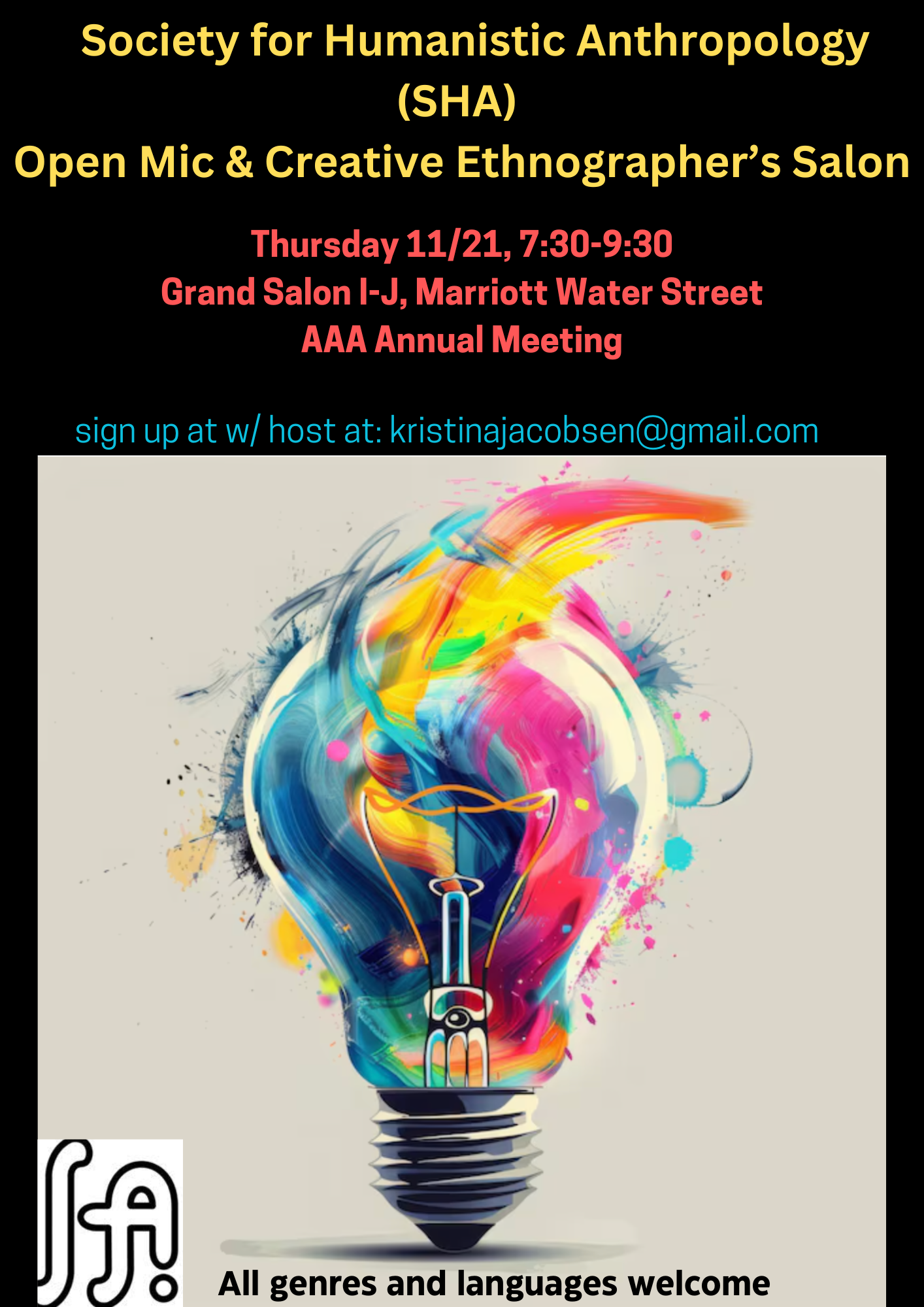Society for Humanistic Anthropology 2025 Ethnographic Poetry Competition
The 2025 Contest is now open!
DEADLINE EXTENDED TO Sunday 29th June
The Society for Humanistic Anthropology is pleased to announce our annual ethnographic poetry competition. This competition speaks to a core part of the SHA’s purpose, in encouraging scholars to use diverse literary genres to explore anthropological concerns.
INVITATION
We seek poems that can use language in an original, reflexive, and impactful way, in order to communicate insights (or ask questions) about particular social worlds. Poems are welcome to connect to key themes associated with any of the five fields of anthropology (i.e. Archaeological, Biological, Linguistic, Sociocultural and Applied.) We recognise that poetry can do the work of describing but also of theorising, deconstructing, and of ‘imagining otherwise’. As such we invite submissions of poetry that evoke, enliven, invite, ask, critique, assert, refuse, speculate, and listen. Poems should ideally show a connection to ethnographic practices, lenses, or sensibilities; drawing on either established or experimental poetic techniques to explore their chosen topics with attention to lived experiences, situated sociopolitical contexts, and holistic and interconnected life worlds. We also seek poems through which writers show appropriate ethical reflexivity around their role in producing knowledge both in and beyond the poem (i.e. in the wider practices of data gathering, analysis, and sense-making that inform the poem); in other words, taking responsibility for locating themselves, their subjects, and their readers within wider conversations, histories, and structures of power/representation.
At the same time as seeking work that engages with the best of contemporary anthropological thinking and practice, we look for poems that exhibit a commitment to craft: that is, making use of the unique techniques, forms, and conventions of poetry in effective (captivating, surprising, memorable, poignant, powerful) ways, where the writer shows deliberacy and skill in how each part of the poem is formed. We encourage entrants to consider poetry’s connection to the vivid, sensuous, and subjective qualities of human experience; to draw on the sonic, rhythmic, and musical qualities of (both everyday and literary) language; to make use of the multimodal impact of poems as visual and material forms as well as textual ones. We aim to recognise diversity of ways that poetry may do any this. As such, as well as poems in traditional or contemporary lyrical forms, we welcome found, multi-textual, or experimental forms that still adhere to the above. This year we also wish to offer an invitation for multi-authored or collaboratively-produced poems to be considered for the prize (alongside single-authored works) in recognition that poems formed in and through projects involving collaboration with participants, or between multiple contributors, may allow for conventions of authorship, representation, and expertise, to be addressed differently.
FORMAT
The competition requests that poems are submitted in the same form as the Anthropology and Humanism journal reviews and publishes poems; that is, with the (one to three) poems accompanied by an ‘ethnographic statement’ of no more than 400 words. We emphasise that the poems themselves should do the main work. However the ethnographic statement, which can help to provide background context for the reader, will be assessed as part of the judging process.
Before submission, please consider exploring the work of the ethnographic poets we have also published in our journal, Anthropology & Humanism, including the winners from previous years.
HOW TO ENTER
Submission deadline this year is June 20th 2025. DEADLINE EXTENDED TO Sunday 29th June
Submissions must be previously unpublished and not currently under consideration elsewhere.
You may submit up to three poems. (Note: if you submit more than one poem, your accompanying ethnopoetry statement may specify whether they are intended as a set or sequence, or as individual entries; the judges will award a prize either to an individual poem, or a set of poems, at their discretion).
There is no entry fee.
The entry consists of two separate parts:
- The online Entry form which collects cover page information (name, contact information, etc.). Information on this form is not taken into account while judges make their award selections, and information collected is used ONLY for award granting and notifications.
- Your poems together in one pdf file WITHOUT the author’s name (i.e. anonymized), and with an extra page with an ethnopoetry statement of no more than 400words that answers the question: “How is this piece anthropologically informed, and in what ways has your background in the field contributed to it?” This statement will be taken into account as the judges make their award selections; examples of ethnographic/ethnopoetry statements can be found here. Please use your first poem title as your document file name. This file should be emailed as a pdf to shapoetrycompetition@gmail.com as soon as your online entry form is completed.
AWARDS:
- All winners will receive one year Society for Humanistic Anthropology (SHA) and American Anthropology Association (AAA) gift memberships.
- The first-place winner will also receive an award of $200 and publication in the Society’s journal, Anthropology and Humanism.
- The second-place winner will also receive $150, and be invited to submit to the journal
- The third-place winner will also receive $100, and be invited to submit to the journal
- All winning entries and honorable mentions will be recognized by the Society for Humanistic Anthropology at the annual meeting of the American Anthropological Association, and all winners will receive a certificate of their award, and be eligible to submit to the journal
2025 JUDGING COMMITTEE: Susan Wardell (chair), Grace Zhao, Khando Langri




